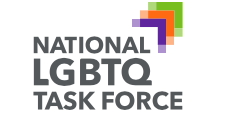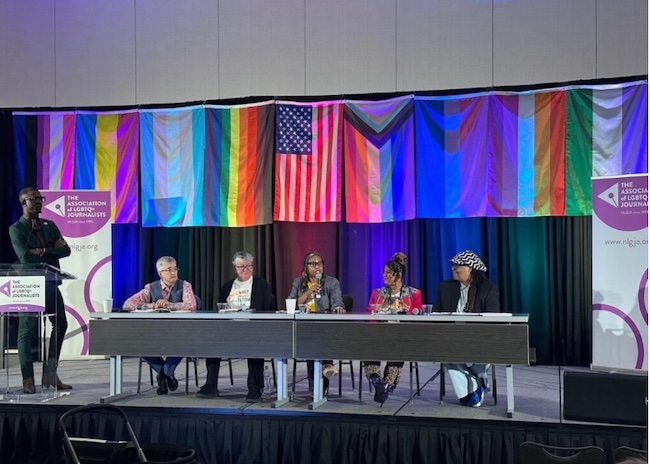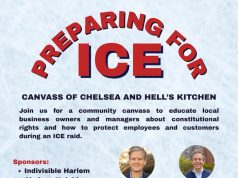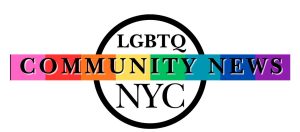WRITTEN & REPORTED BY FRANK PIZZOLI
 THE NATIONAL LGBTQ TASK FORCE | Cathy Renna–speaking on behalf of the National LGBTQ Task Force–said, from an organizational point of view, “Our organizations are coordinating, collaborating, and scenario-planning, as we have to constantly respond to new and increasingly vicious attacks, particularly on our trans and non-binary communities,” Efforts also include “from having our staff on Capitol Hill to our field team working with statewide groups on issues that they are dealing with, and anti-trans legislation that’s passing.”
THE NATIONAL LGBTQ TASK FORCE | Cathy Renna–speaking on behalf of the National LGBTQ Task Force–said, from an organizational point of view, “Our organizations are coordinating, collaborating, and scenario-planning, as we have to constantly respond to new and increasingly vicious attacks, particularly on our trans and non-binary communities,” Efforts also include “from having our staff on Capitol Hill to our field team working with statewide groups on issues that they are dealing with, and anti-trans legislation that’s passing.”
Regarding more public work, Renna said, “All of us are out in the streets. We are collaborating really well, in terms of coordinating with our legal experts and the lawyers on the front lines of the many cases we’re fighting.” As an example, Renna refers to the June 18, United States v. Skrmetti decision, upholding a Tennessee law banning certain gender-affirming medical care for minors. The 6–3 majority opinion found that the ban was constitutional because it regulated a medical procedure based on age and diagnosis, not sex, and therefore did not trigger a higher standard of judicial review. “We coordinated with the ACLU and others, to have a street response of protests and demonstrations.”
Renna advises individuals in the community “to get involved in any way that you can–from volunteering, to supporting local organizations, to participating–whether virtually or in person–as we reach out to our elected officials.” She also asked individuals “to get in the streets to protest and engage with our friends, families, and communities to help them understand the impact that the administration is having on all of us.”
Listening to Renna, one wants to say out loud: Although the arc of the moral universe eventually bends toward justice, it does not bend all on its own, nor does it stay there on its own.

At the September annual conference of the National Gay & Lesbian Journalists Association–on the theme of Not Our First Fight: What Can We Learn from Other Social Justice Movements and Longtime LGBTQ+ Advocates–Renna commented on the increase of safety issues in media coverage, including the need for anonymity of individuals being interviewed, particularly trans youth and families. “It’s heartbreaking to once again have to work with journalists in this way, requesting anonymity or first name-only identification of sources, as well as not sharing geographic information,” Renna said. “This is reminiscent of the years when people with AIDS, active-duty service members, and LGBT people facing discrimination could not safely be open in the media as well.”
Historically, the National LGBT Task Force is known for producing Creating Change, a political, leadership, and skills-building conference. The next event is January 21–25, 2026, in Washington, DC.
 THE LGBTQ+ VICTORY FUND | Orie Givens, VP of Communications, LGBTQ+ Victory Fund, said, “I think LGBTQ+ political activities now are wholly centered on protecting our communities, working to resist whenever possible, and standing up for our rights and freedoms. Many of our elected officials are on the front lines of battling anti-equality forces in their governments or places where they live, working to combat hateful policies and create equality-driven solutions.”
THE LGBTQ+ VICTORY FUND | Orie Givens, VP of Communications, LGBTQ+ Victory Fund, said, “I think LGBTQ+ political activities now are wholly centered on protecting our communities, working to resist whenever possible, and standing up for our rights and freedoms. Many of our elected officials are on the front lines of battling anti-equality forces in their governments or places where they live, working to combat hateful policies and create equality-driven solutions.”
Givens stresses that our community is made up of fighters, and our legacy is resistance. “We’re seeing more individuals answer the call to engage in our training program and indicate interest in running for office,” Givens said, adding, “We’re seeing increased collaboration among organizations, and we are rising up in large and small ways nationwide.”
In contrast to other voices in this story who stress that new approaches are needed, Givens noted, “The national organizations are united and in constant collaboration, as it takes all of us to be on the same page to face these threats. Whether they are supporting constituents and the community, amplifying stories and experiences, or litigating for our rights in the courts, this moment is an all-hands moment where changes come constantly.”
On the plus side, Givens notes, “Despite all of the challenges we face, we have more LGBTQ+ elected representation than ever in our history. And we have the ability to grow that even more in November, and in 2026 and 2028. LGBTQ+ Victory Fund has endorsed more than 230 candidates including several in New York City who need support to get elected and fight for us.” In order to achieve parity, the community would need “nearly 47,000 LGBTQ+ elected officials nationwide to achieve equitable representation.”
 LAMBDA LEGAL | Nathan Maxwell, Senior Attorney, Lambda Legal Defense and Education Fund, leads the effort from the organization’s Lambda Legal’s Midwest Regional Office, based in Chicago, IL. Lambda Legal is a national organization working to achieve full recognition of the civil rights of lesbians, gay men, bisexuals, transgender people, and everyone living with HIV, through impact litigation, education, and public policy work.
LAMBDA LEGAL | Nathan Maxwell, Senior Attorney, Lambda Legal Defense and Education Fund, leads the effort from the organization’s Lambda Legal’s Midwest Regional Office, based in Chicago, IL. Lambda Legal is a national organization working to achieve full recognition of the civil rights of lesbians, gay men, bisexuals, transgender people, and everyone living with HIV, through impact litigation, education, and public policy work.
With legal fingers in all sorts of queer civil rights cases, Maxwell is lead attorney in Iowa Safe Schools v. Reynolds, in which Lambda Legal—along with ACLU of Iowa and Jenner & Block LLP—is challenging SF 496, a sweeping Iowa law that seeks to erase any recognition of LGBTQ+ people from public schools, ban books with sexual or LGBTQ+ content, and forcibly out trans or nonbinary students.
Recent Lambda Legal victories have included these three significant cases.
“We had a recent victory on behalf of trans folks seeking to correctly identity documents,” said Maxwell, “where a court ordered the U.S. Department of State to process the passport applications of several transgender U.S. citizens with accurate sex markers that reflect their gender identity, blocking an executive order from the Trump administration that would have prevented the State Department from issuing correct and accurate identity documents.”
Another example is the San Francisco AIDS Foundation v. Trump case, where the court granted a preliminary injunction blocking the implementation of three Trump executive orders that would have defunded health and support services for LGBTQ+ people, and people living with (or at risk of) HIV. “The win protects important programs like the San Francisco AIDS Foundation, and the Los Angeles and New York LGBTQ Centers can keep their doors open, serving the community and saving lives without worrying about threats to their funding,” Maxwell said.
Lambda Legal also achieved a preliminary injunction on behalf of a large group of health researchers whose grant funds had been suddenly and summarily canceled or whose grant applications were unlawfully withheld from review because their research involved LGBTQ+ or DEI topics. “In that case,” noted Maxwell, “the National Institutes of Health terminated hundreds of research grants [totaling somewhere around $800 million] in response to executive orders from the Trump administration that forbade federally-funded entities from engaging in DEI or accessibility programs or from recognizing the existence of transgender people. Because of our lawsuit, a large group of researchers will have their funding restored and will be able to continue researching critical topics related to health and healthcare.”
From an overall perspective on the queer movement, Maxwell shared, “Yes, the national legal organizations are coordinating. But nationwide, there isn’t a singular strategy document to work from as we all proceed.” He adds, “It has been my experience that people regularly ask how to help us. With a donation [I respond].”
Litigation is expensive, Maxwell notes. “and the kind of litigation we do can be even more so. We simply cannot do it without financial assistance.”
What can one do on a local level?
Maxwell recommends “joining local legal battles with donations, and maintain a presence if asked to come out to publicly support the goals of a case in progress before the courts.Create community where there is none. Be there when someone takes steps to thwart current efforts to suppress LGBTQ civil rights or content.”
The main point Maxwell stresses is that the larger queer community should not “force trans people to go through this alone.”
 THE NATIONAL CENTER FOR LGBTQ RIGHTS | Signaling a further retreat from civil rights for queers: On September 10, 2025, the National Center for LGBTQ Rights condemned the Supreme Court’s 6-3 decision to lift restrictions on federal immigration enforcement in Los Angeles, warning that the ruling will place LGBTQ asylum seekers at unprecedented risk of discrimination, violence, and deportation to countries where they face persecution or death.
THE NATIONAL CENTER FOR LGBTQ RIGHTS | Signaling a further retreat from civil rights for queers: On September 10, 2025, the National Center for LGBTQ Rights condemned the Supreme Court’s 6-3 decision to lift restrictions on federal immigration enforcement in Los Angeles, warning that the ruling will place LGBTQ asylum seekers at unprecedented risk of discrimination, violence, and deportation to countries where they face persecution or death.
“Today’s Supreme Court decision is a devastating blow to LGBTQ asylum seekers who have already endured unimaginable persecution and violence,” said Imani Rupert-Gordon, President of the National Center for LGBTQ Rights. “By green-lighting discriminatory profiling tactics, the court has essentially given immigration agents a license to target the most vulnerable members of our community.”
According to their news release, the court’s ruling allows federal agents to resume “roving patrols” and conduct immigration stops based on factors including appearance, language, occupation, and location–tactics a federal judge had previously found violated the Constitution based on “a mountain of evidence” of discriminatory enforcement.
More than half of LGBTQ asylum seekers come from Central America’s Northern Triangle, where they face systematic violence, discrimination, and persecution. A 2021 study found that 1.3 million adult immigrants in the U.S. identify as LGBTQ, including 289,700 who are undocumented.
“The LGBTQ community knows what it means to face persecution and discrimination,” said Noemi Calonje, Hogar [Home] Director NCLR’s Immigration & Asylum Program. “We cannot stand silent while our most vulnerable community members are hunted down and sent back to face torture or death. This is a moment that demands our collective action and solidarity.”
—END—
ABOUT FRANK PIZZOLI | Pizzoli’s essays, book reviews, profiles, and reviews have been published nationwide. He founded the award-winning LGBTQ newspaper The Central Voice (2003-2020) and Positive Opportunities, Inc. (1997-2017), a nonprofit that provided employment counseling and training for HIV-positive individuals. His work is chronicled in Out in Central Pennsylvania: The History of an LGBTQ Community (Penn State University Press). Pizzoli’s latest book, Passionate Outlier: Gay Writers and Allies on Their Work, is available from Rebel Satori Press.
LGBTQCommunityNews.nyc is an independent, free source of queer-centric news, arts, info, and opinion content. Our website, podcast, and quarterly newspaper are funded by advertising revenue and reader donations. To support this project, click here for the GoFundMe campaign. Questions? Comments? Click here to contact us. To join the subscriber list of our free ENewsletter, click here.









